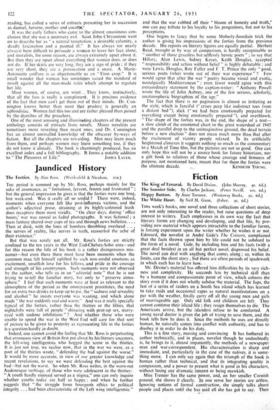Jaundiced History
THE period is summed up by Mr. Ross, perhaps mainly for the sake of assonance, as " fortuitous, fervent, frozen and frustrated " ; but the general impression he gives is that the forties were one long, lost week-end. Was it Fealty all so sordid ? There were, indeed, moments when everyone felt like post-influenza victims, and the author's adjectival prose, straining at its highly-coloured leash does recapture them most vividly. " On clear days, during office hours,' war was unreal as faded photographs. It was fictional ; a mass fantasy shared over cups of tea and through news bulletins.... Then at dusk, with the lines of bombers throbbing overhead . . . the nerves of reality, like nerves in teeth, reasserted the ache of their existence."
But that was surely not all. Mr. Ross's forties are strictly confined to the ten years in the West End-Chelsea-Soho area—and for this reason the title of his book is a rather disingenuous mis- nomer—but even there there must have been moments when the common man felt himself uplifted by such non-sordid emotions as excitement, unselfish love for his fellows, and pride in the courage and strength of his countrymen. Such moments were not observed by the author, who tells us in an " editorial note " that he is not trying to re-tell the familiar story, but only to " preserve atmo- sphere." I feel that such moments were at least as relevant to the atmosphere of the period as the omnipresent prostitutes, the need for an extra two drinks to keep up to par, the " sadness and sexuality and alcohol " he insists everyone was wanting, and which alone made " the war suddenly real and warm." And was it really specially typical of the forties, rather than the thirties or the fifties, that nightclubs were full of people "shivering with pent-up sex, starry- eyed with undone inhibitions " ? And whether those who were unable to spend the war in the West End will care for that sort of picture to be given to posterity as representing life in the forties is a question hardly in doubt.
Indeed, one cannot avoid the feeling that Mr. Ross is perpetuating that erroneous view of Britain first put about by his literary ancestors, the left-wing intelligentsia who hogged the scene in the thirties. It is just not true, we realise now, that in the war we were, as a poet of the thirties wrote, "defending the bad against the worse." It would be more accurate, in view of our greater knowledge and recent revelations, to say we were defending the best against the bad—but not the worst. So when Mr. Ross writes, in the worn-out Audenesque verbiage, of those who were adolescent in the thirties: " A youth hardly enjoyed served as a stigma," one can only inquire whether youths today are half as happy ; and when he further suggests that " the struggle from bourgeois ethics to political integrity ... had been characteristic of the Left wing intelligentsia "
and that the war rubbed off their " bloom of honesty and truth," one can pay tribute to his loyalty to his progenitors, but not to his perceptions.
One begins to fancy that by some Moberly-Jourdain trick the author is giving his impressions of the forties from the previous
decade. His reports on literary figures are equally partial. Herbert Read, brought in by way of comparison, is hardly recognisable as " another of those graceless but selflessly heroic poets" ; to say that Hillary, Alun Lewis, Sidney Keyes, Keith Douglas, accepted " responsibility and action without belief " is highly debatable ; and were Lewis, Douglas, Roy Fuller and F. T. Prince the only " good, serious poets (who) wrote out of their war experience " ? Few would agree that after the war " poetry became visual and exotic, nostalgically Mediterranean " ; even fewer would agree with this extraordinary statement by the caption-writer: " Anthony Powell wrote the life of John Aubrey, one of the few serious, scholarly, unatmospheric biographies of the age." The fact that there is no pagination is almost as irritating as the style, which is fanciful (" crises peep like indistinct toes from a distant bed "), slick (" we had been emotionally prepared for everything except being emotionally prepared "), and overblowit " The shape of the forties was, in the end, the shape of a tent— a slow climb of the emotional chart to the great watershed of 1945 and the parallel drop to the unimaginative ground, the dead terrain before a new election " does not mean much more than that after the excitement of victory people relaxed. in its artificially heightened climaxes it suggests nothing so much as the commentary to a March of Time film, but the pictures are not so good. One can only hope this will not be a source book for future historians, nor a gift book to relatives of those whose courage and firmness of purpose, not mentioned here, meant that for them the forties were






































 Previous page
Previous page